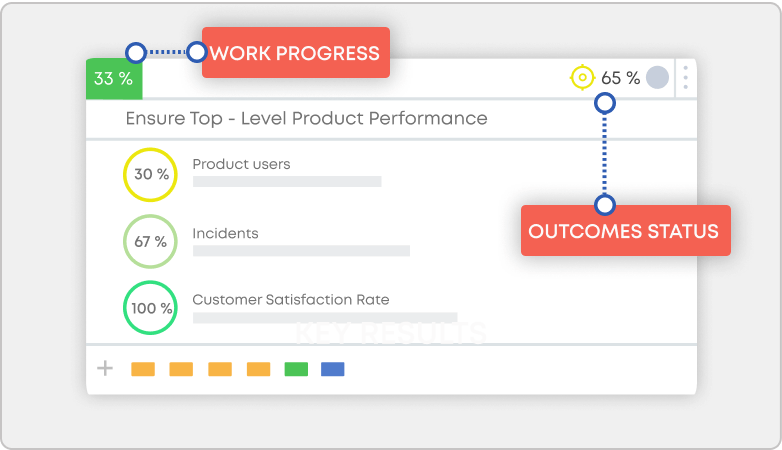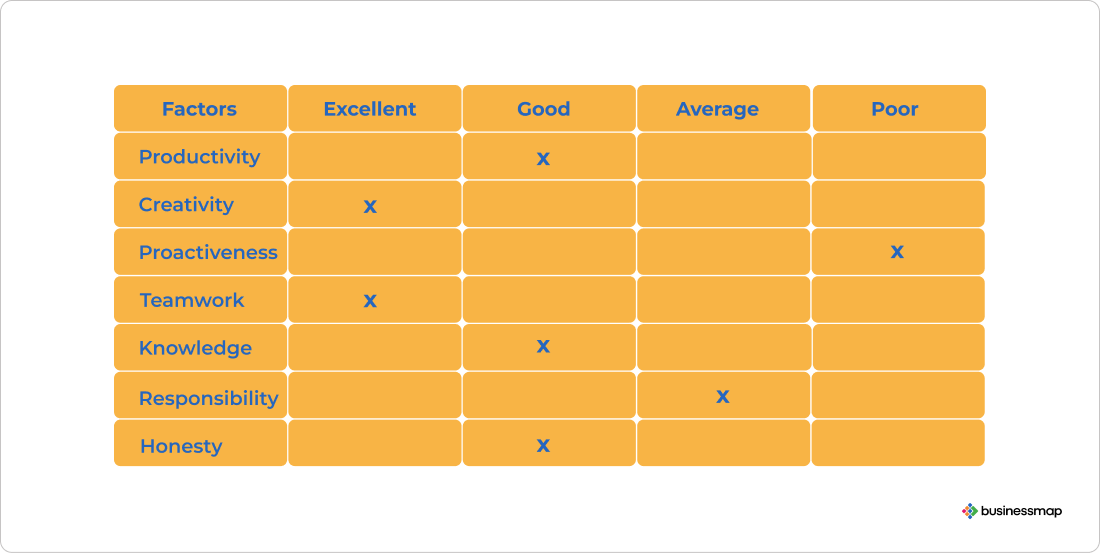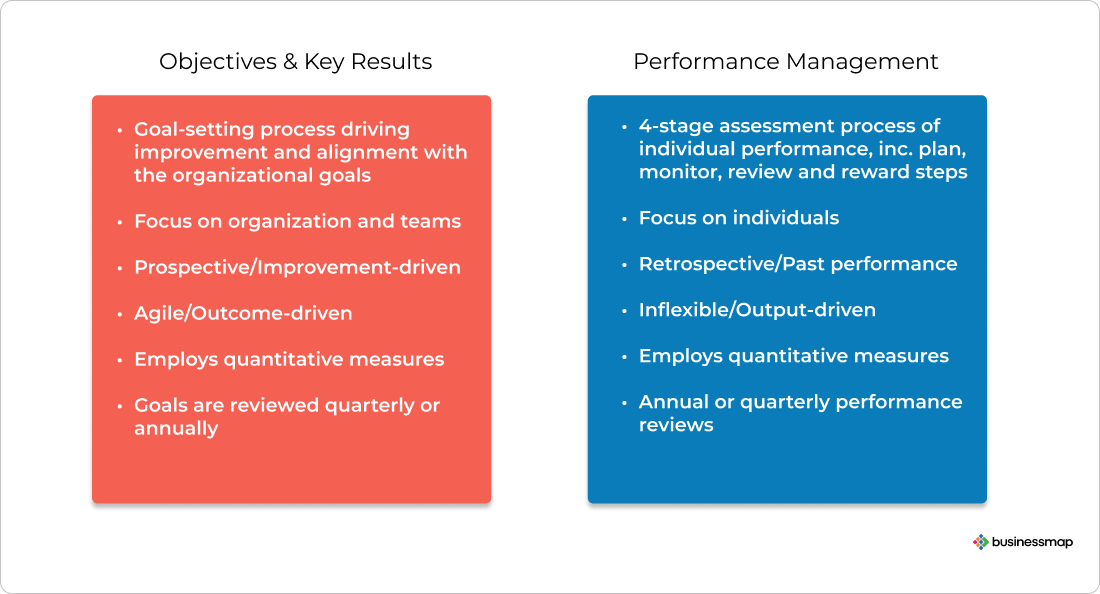How are OKRs and performance management different? OKR is a goal-setting framework based on collaboration and focused execution of goals. You can use a simple formula to write OKRs: We will [objective] as measured by [key results].

Performance management (PM) is an evaluation process that helps assess individual performance. An employee PM process goes through the stages of planning, monitoring, reviewing, and rewarding.
In what other ways do OKRs and performance management differ? Can they co-exist, and should they? Let’s discover more.
What Are the Key Differences between OKRs and Performance Management?
While OKRs aim to promote aspirational goal thinking and align everybody around the same objectives, traditional performance management focuses on business-as-usual performance.
1. Alignment with Goals vs. Tactical Execution
As outlined, OKR’s purpose is to achieve company-wide alignment with the organizational goals, while performance management is simply a process that ensures your outputs meet the goals.
Focusing on meaningful outcomes, writing down OKRs prompts creativity and innovative thinking where team members define the specific activities they need to execute. In contrast, managing performance is focused on outputs and tactical execution.
In that sense, OKRs can help you answer “How everyone on my team contributes to the company goals?” while managing performance can narrow down the answer to “How have my team members performed for a given period of time?”
2. Collaborating Teams vs. Measuring Personal Performance
In terms of scope, the OKR framework highlights the importance of the team, as well as setting team and company goals in collaboration. The very process of defining OKRs requires collaboration and thinking in the same direction toward answering, “What shall we do to deliver outcomes and gradually achieve the organizational goals?”.
 OKRs are about aligning strategy with execution
OKRs are about aligning strategy with execution
Performance management, however, is mostly concerned with the individual execution of tasks or output delivery for a given period of time. Performance management can help you understand if your team fellows are meeting their performance targets.
 Performance management is about individual contribution
Performance management is about individual contribution
While performance indicators can offer great insights into the individual level of execution, OKRs on a personal level can be counter-productive to a team. By aiming to achieve your personal goals instead of the company's or the team’s OKRs, the focus could shift, slowing down delivery.
3. Priorities vs. Indicators
In a nutshell, OKRs put an emphasis on what is the most pressing matter at present. A successful OKR implementation means that goals are always aligned with the organizational priorities.
This vibrant connection is achieved through regular OKR check-ins. The events offer the necessary opportunities for collaborators and management to share feedback, ensure work is aligned with priorities, or shift the focus if needed. The regularity of the OKR meetings also ensures that operational execution indeed contributes to reaching the organizational goals and that all efforts align with the strategic vision.
While OKR focuses on the team and priorities, performance management is concerned with the level of employee performance for a given period against specific targets. As such, KPIs are traditionally developed by team managers for a 12-month period. OKRs and KPIs both offer measurement insights into a company’s performance, however, OKRs portray the organizational direction, whereas KPIs don’t necessarily convey that message.
4. Performance Reviews and OKRs
Another key difference between OKRs and performance management concerns reviews. Performance reviews are about individual contributors and are output-driven, whereas OKRs look at the business as a whole and are outcome-driven.
In essence, performance reviews are formal meetings between team managers and team members where individual performance is assessed against target indicators. Such one-on-one evaluations ought to be personal, accurate, and are usually tied to bonuses, rewards, or promotions.
While performance reviews can ideally facilitate the delivery of operational goals in the future, they are designed to examine how people have performed in the past. In contrast, OKRs are not to be used as a form of appraisal, their purpose is to align everyone with the present organizational priorities and highlight what really matters now.
Why You Shouldn’t Use OKRs for Performance Management?
Let’s sum up the leading reasons why OKRs are not the best choice when it comes to managing performance.
- OKRs are highly collaborative, which makes them prone to be inaccurate as performance reviews that aim to be fair and accurate.
- OKRs are focused on outcomes while managing performance is output-driven.
- Using OKRs as performance evaluations leads to top-down management, which may negatively affect engagement, creativity, and productivity.
- OKRs aim to achieve company-wide alignment with the organizational direction while managing performance is focused on individual performance indicators.
 OKRs and Performance management comparison of key characteristics
OKRs and Performance management comparison of key characteristics
Can OKR and Performance Management Be Used Together?
Managing performance can be used to indicate if you are using the appropriate metrics that accurately measure the execution of your company goals. Leveraging both, you can better answer for yourself, “Are you focusing on doing the right activities at the right moment?”.
Combining OKRs and performance measurement can help you spread outcome-oriented thinking. After all, OKR is a goal-setting system whose focus can’t be further away from day-to-day business. With its aspirational, ambitious goals and focus on improvement, the OKR framework’s aim is to develop a cultural shift toward exploration, bold and innovative decisions.
As a result, you can move the focus away from operational to strategic goals, from quantitative to qualitative performance metrics, and embrace continuous improvement.
As outlined, there are clear distinctions between OKRs and PM, however, aligning goals and performance management can be used synchronously toward better organizational performance. It would require shifting your understanding of the traditional ways of managing performance toward agility, responsiveness, and seeing the big picture. And OKRs can help you get there.
We offer the most flexible software platform
for outcome-driven enterprise agility.
In Summary
OKRs and performance management are strategic management approaches different in nature, focus, and techniques they employ. While they can be used together, you must understand their purpose well.
- OKR is not a performance management tool but a goal-setting framework
- Performance management is an evaluation process for the individual, team, or company performance
- OKRs aim to align everyone around the organizational goals and set the right measures that track the execution of the strategic goal
- PM appraisals are directly tied to compensation, bonus, and promotions






 OKRs are about aligning strategy with execution
OKRs are about aligning strategy with execution Performance management is about individual contribution
Performance management is about individual contribution OKRs and Performance management comparison of key characteristics
OKRs and Performance management comparison of key characteristics

